One last toast: Legacy of Doolittle Raiders honored at 'extraordinary' Final Goblet event
- Oops!Something went wrong.Please try again later.
NICEVILLE — In a voice faltering with emotion, Secretary of the Air Force Frank Kendall closed another chapter in the history of the Doolittle Raiders on Monday at Northwest Florida State College, offering the final toast to the 80 storied Army Air Forces airmen who volunteered for the daring bombing raid on Japan in the early months of World War II.
"I'm a little bit overwhelmed by the occasion," Kendall told a capacity crowd in the 1,650-seat Mattie Kelly Arts Center that included dozens of Doolittle Raiders descendants along with Chief of Staff of the Air Force Gen. Charles Q. Brown, Air Force Special Operations Command commander Lt. Gen. Jim Slife and Lt. Gen. Brad Webb, commander of the Air Force's Air Education and Training Command.
History of the Doolittle Raiders: Doolittle Raid brought hope after Pearl Harbor; 80 years later, mission still 'unbelievable feat'
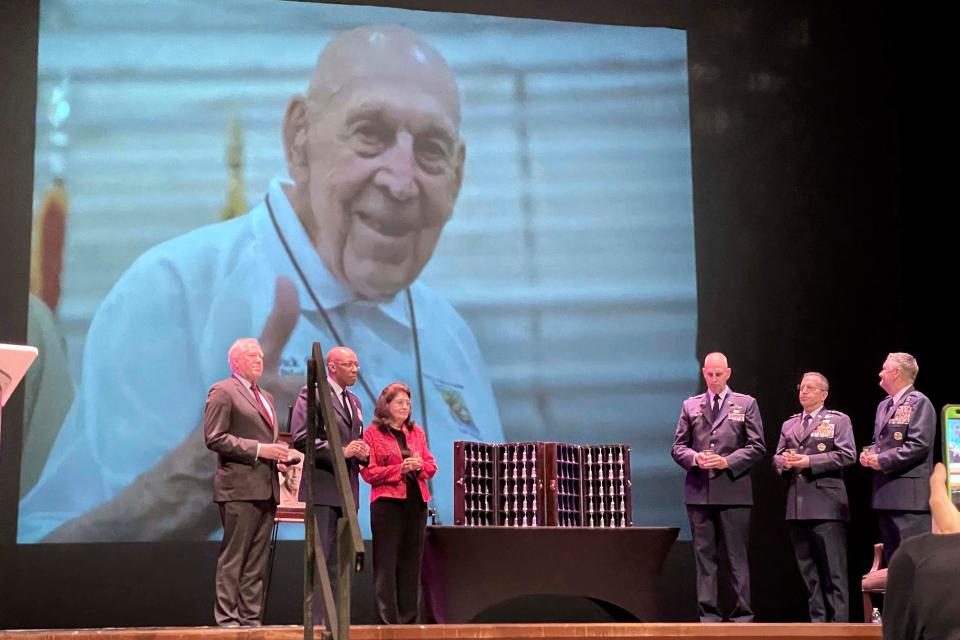
Calling the final toast of the Doolittle Raiders "an extraordinary event," Kendall said the intrepid airmen, under the leadership of then-Lt. Col. Jimmy Doolittle, created a legacy that continues in today's Air Force.
"Their legacy lives on in our minds and actions, both individually and collectively, and it always will," Kendall said. "The selfless spirit that the Raiders flew with has passed from generation to generation."
That legacy is particularly tightly woven into the fabric of this area. For a little more than two weeks in March 1942, the Doolittle Raiders trained at what was then Eglin Field for the difficult task of flying bombers off the deck of an aircraft carrier in the Pacific Ocean to strike military and industrial targets in Japan.
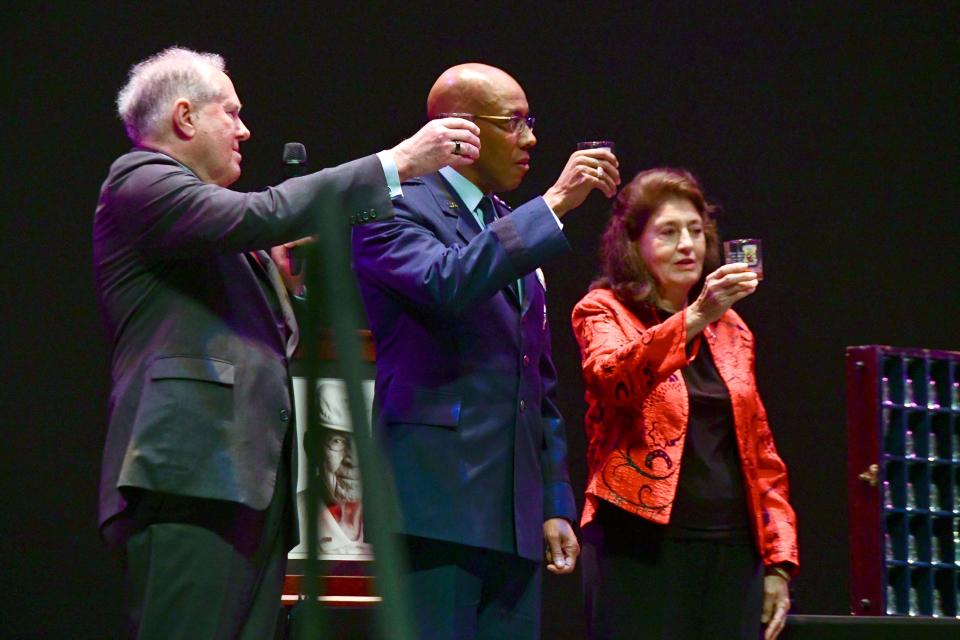
On April 18, 1942, 16 B-25 bombers took off from the deck of the USS Hornet to hit targets in Tokyo, Yokohama, Nagoya and Kobe.
Each plane carried four 500-pound bombs, and had been stripped of extraneous equipment to accommodate additional fuel. But even the extra fuel wasn't enough, as the bombers had to launch early after being spotted by a Japanese patrol boat.
As a result, the crews were forced to bail out of their planes over China after the bombing raid or to try to land as close to the Chinese coastline as possible. Just one of the bombers, which landed in Russia — a U.S. ally at the time — made it safely to the ground.
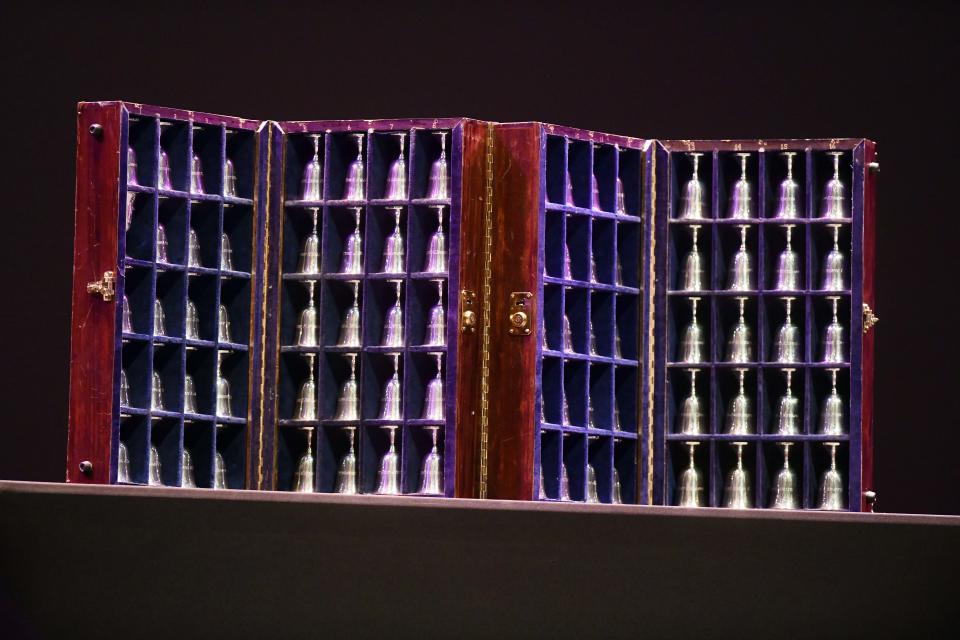
Three of the 80 Raiders were killed, either in crashes or while parachuting away from their bombers. Eight were captured by the Japanese. Of those, three were executed, one died of starvation and disease in captivity, and four were subjected to more than three years of solitary confinement and brutality.
While the damage to Japanese infrastructure was relatively slight, the raid was considered a success.
It showed Japan was not beyond the reach of American air power, providing a morale boost to U.S. military personnel and the American people just four months after the devastating surprise attack on Pearl Harbor.
The Doolittle Raiders tradition that was closed out Monday had its beginnings in 1959 in Tucson, Arizona, when that city hosted one of the regular Raiders' reunions. As a gift, the city presented them with a set of 80 silver goblets to use in their toasts to fellow airmen who died in the raid or had passed away in the intervening years.
Each goblet was engraved with the name of one of the 80 airmen, with the goblets for the surviving Raiders at the time being engraved twice, once right-side-up and once upside-down. At each reunion, the goblets of the men who had passed since the last reunion were turned upside down to mark their passing.
The Doolittle Raiders toasted with 1896 Hennessy V.S. cognac in a nod to Doolittle's birth year, with the following words delivered by the most senior Raider present: "To those who gave their all in the success of our mission, and to those who have joined them since, our fondest memories, sincerest appreciation and gratitude. May they rest in peace."
'Mission complete, Col. Cole': Last of the WWII Doolittle Raiders interred, promoted to colonel
The Raiders held their own final toast in 2013, when the four remaining men decided that, rather than waiting until there were just two of them left, they would hold a last commemoration at the National Museum of the U.S. Air Force.
The last Raider, retired Air Force Lt. Col. Richard E. "Dick" Cole, a frequent visitor to Northwest Florida, died in 2019 in Texas at the age of 103. He was posthumously promoted to the rank of colonel, and was interred last year at Fort Sam Houston National Cemetery in Texas with his wife, Lucia.
Cole served as Doolittle's copilot in the lead B-25, which had the least amount of room for takeoff from the Hornet's deck.
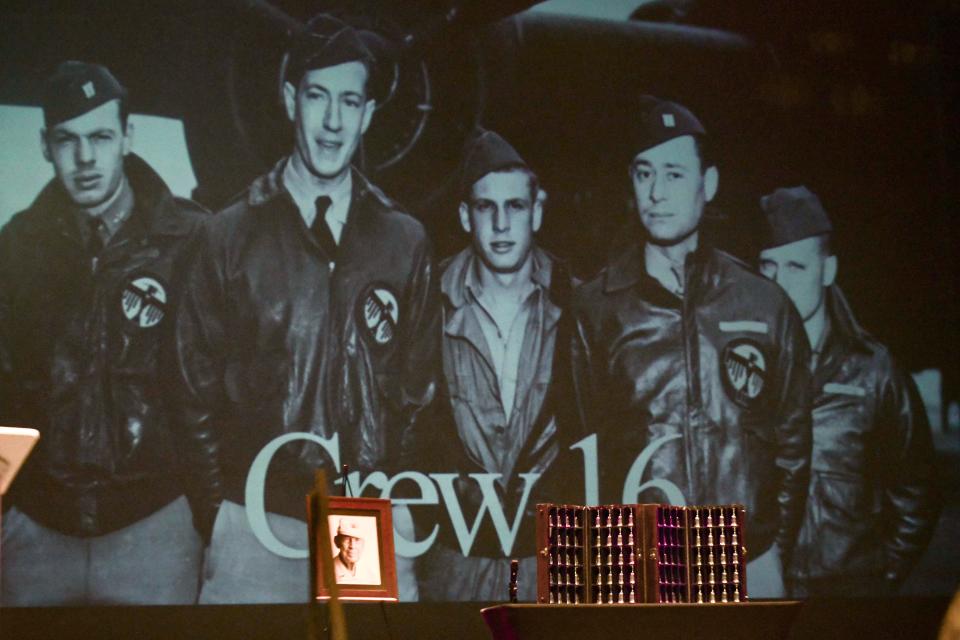
Cole, like the other Raiders, was consistently humble about his role in the mission. “I don’t think that the Raiders should be remembered any more than the millions of other people who took part in World War II,” Cole said during a 2018 interview with the Daily News.
Cole's goblet was turned over Monday by two of his children — Dr. Rich Cole, a retired Air Force lieutenant colonel, and Cindy Cole Chal.
In delivering the final toast, Kendall had to slightly modify its wording, delivering it "to the Doolittle Raiders, who gave their all ... ."
And in another departure from tradition — the toast routinely had been held in private — Monday's audience was asked to deliver the Raiders' traditional response to the toast.
And so it was that after Kendall completed the toast, the words "To those who have gone" echoed softly across the auditorium.
In comments following the toast and the turning over of his father's goblet, Rich Cole said the legacy of the Raiders might best be found in their determination as volunteers to complete the mission. Despite being offered chances repeatedly by Doolittle to opt out of the aid, Cole said, "They all went anyway."
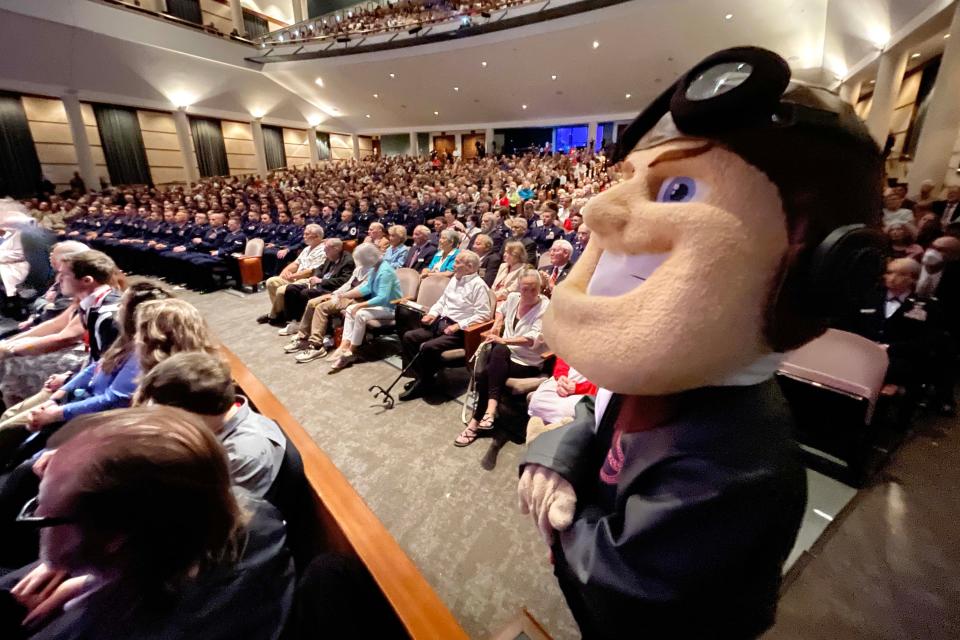
That spirit, Cole said, echoing Kendall's comments, lives on in the U.S. military services. Asking the active-duty, Reserve and National Guard troops in the audience to stand, Cole said, "Ladies and gentlemen, the Raider legacy stands before you."
Like Cole and Kendall, Brown also called to mind their legacy, assuring the audience, "We never forget the contributions of these 80 bold airmen."
Pronouncing himself "incredibly humbled" to be a part of Monday's ceremony, Brown noted that after the devastating attack on Pearl Harbor, the Raiders "provided America with hope that the war could be won."
In addition to the toast, Monday's ceremony included a roll call of each of the 80 men, accompanied by crew photos on a large video screen highlighting each Raider as his name was called.
Throughout the roll call, Raider descendants or Air Force airmen representing each Raider stood and answered "Present" as the names were called. Eleven of the 16 crews that bombed Japan were represented by descendants at the ceremony.
Also speaking Monday was Devin Stephenson, the president of NWF State, where the student body chose the name "Raiders" as their mascot in 1964. The costumed "Jimmy Raider" mascot was on hand for Monday's commemoration.
"The Raiders are in our DNA at this college," said Stephenson, who pledged that the school "will continue to honor the Raiders."
The Doolittle Raiders were not the only veterans recognized on Monday. The long roster of guests for the final goblet ceremony included Frank Emond, a local 103-year-old veteran of Pearl Harbor who was aboard the battleship USS Pennsylvania on Dec. 7, 1941; retired Air Force Col. Ed Hubbard, who spent nearly seven years as a prisoner of war in Vietnam; and retired Air Force Col. Howard Hill, who spent six years as a POW in Vietnam.
The goblets and their case, which were displayed for a time after the ceremony in the lobby of the Mattie Kelly Arts Center, will be returned to the National Museum of the United States Air Force at Ohio's Wright-Patterson Air Force Base, where they have been part of an exhibit on the Doolittle Raiders for many years.
This article originally appeared on Northwest Florida Daily News: 'Final Goblet' ceremony honors World War II Doolittle Raiders

